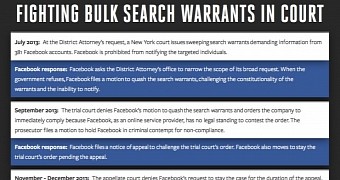Facebook’s lawsuit against the Manhattan district attorney’s office can move forward, an appeals court decided. The company had been asked to hand over the entire collection of data on 381 users.
Understandably, Facebook has protested in taking such a step and violating the privacy of so many users who were being investigated for fraud. The company was eventually forced to hand over the information
The New York Times reports that Justice John Sweeny rejected the prosecutors’ motion to dismiss Facebook’s challenge on the search warrant dating back to 2013 as part of a fraud investigation. Earlier this year, Facebook revealed that the entire demand was pointless because only 62 people of the 381 ended up being charged.
“Since last summer, we’ve been fighting hard against a set of sweeping search warrants issued by a court in New York that demanded we turn over nearly all data from the accounts of 381 people who use our service, including photos, private messages and other information. This unprecedented request is by far the largest we’ve ever received—by a magnitude of more than ten—and we have argued that it was unconstitutional from the start,” wrote Facebook’s Chris Sonderby, deputy general counsel, back in June.
The judge also decided to invite several technology companies, including Google, LinkedIn and Twitter, to file briefs supporting Facebook’s position on the matter. A full hearing is scheduled for December.
Facebook seeks to stop such feature demands
Many have said that the Fourth Amendment protection against unreasonable searches is against what’s happened with Facebook. The company has pointed out that what Justice Melissa Jackson of State Supreme Court has signed a general search warrant, which is not something acceptable.
Facebook was even forced to not tell its users about the data demands, something that the social network considers to be in violation of those users’ free speech rights.
The social network that has nearly 1.3 billion users has received quite a bit of support from human rights advocates. The New York Civil Liberties Union, as well as other social media companies have already filed amicus briefs in the case.
Mariko Hirose, a lawyer with the civil liberties union, said the original order included innocent relatives that were known to have spoken to certain individuals that were ultimately accused of fraud. The information from these accounts was used to charge police officers, firefighters and other civil servants for falsely claiming to be disabled to obtain money from the government’s Social Security.

 14 DAY TRIAL //
14 DAY TRIAL //